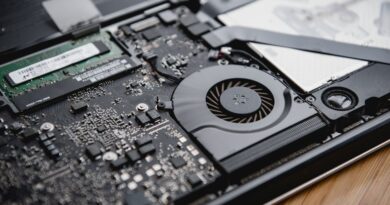Top Tips for Computer Optimization
Welcome to the ultimate guide on how to optimize your computer for peak performance! In today’s digital age, our reliance on computers for work, entertainment, communication, and so much more has never been greater. However, with increased usage comes the inevitable slowdowns, glitches, and frustrations that can hinder our productivity and overall experience. That’s where computer optimization comes in.
Computer optimization refers to the process of fine-tuning your system to ensure it runs smoothly, efficiently, and at its full potential. By following the top tips outlined in this article, you can keep your computer in top shape and maximize its performance. Whether you’re a casual user, a business professional, or a hardcore gamer, these tips will help you get the most out of your machine.
The Importance of Computer Optimization

By Nataliya Vaitkevich via Pexels
Before diving into the specific tips, let’s first understand why computer optimization is essential. Over time, as you use your computer, various factors can contribute to a decrease in performance. These factors include software bloat, malware, disk fragmentation, outdated hardware, and more. Without regular maintenance and optimization, your computer can become slow, unresponsive, and prone to crashes.
By optimizing your computer, you can:
- Improve system speed and responsiveness
- Enhance overall performance
- Extend the lifespan of your hardware
- Reduce the risk of system crashes and data loss
Now that we understand the importance of computer optimization, let’s explore the top tips to help you keep your system running smoothly.
1. Clean Up Your Hard Drive
One of the most effective ways to optimize your computer is by cleaning up your hard drive. Over time, your hard drive can become cluttered with unnecessary files, temporary data, and cached information that take up valuable space and slow down your system. By regularly cleaning up your hard drive, you can free up space, improve performance, and prevent storage-related issues.
To clean up your hard drive:
- Delete temporary files and caches
- Uninstall unused programs and apps
- Organize your files and folders
- Use disk cleanup tools to remove junk files
By keeping your hard drive clean and organized, you can ensure that your computer operates at its best.
2. Update Your Software

By Anna Nekrashevich via Pexels
Another crucial aspect of computer optimization is keeping your software up to date. Software updates often include bug fixes, security patches, performance improvements, and new features that can enhance your overall experience. By regularly updating your operating system, drivers, and applications, you can ensure that your computer remains secure, stable, and efficient.
To update your software:
- Enable automatic updates where possible
- Regularly check for updates manually
- Update drivers through the Device Manager
- Install the latest version of applications
By staying current with software updates, you can prevent compatibility issues, security vulnerabilities, and performance bottlenecks.
3. Optimize Startup Programs
When you start your computer, various programs and services may launch automatically, running in the background and consuming system resources. This can slow down your startup time and overall performance. By optimizing your startup programs, you can reduce boot times, free up memory, and improve system responsiveness.
To optimize startup programs:
- Disable unnecessary startup items
- Use Task Manager or System Configuration to manage startup programs
- Consider using third-party startup management tools
By controlling which programs launch at startup, you can streamline your system’s boot process and ensure that only essential applications are running in the background.
4. Manage System Resources
Efficiently managing system resources is another key aspect of computer optimization. Your computer’s CPU, memory (RAM), and disk drive are essential components that directly impact performance. By monitoring resource usage, optimizing settings, and allocating resources effectively, you can ensure that your system operates smoothly and efficiently.
To manage system resources:
- Monitor resource usage with Task Manager or Resource Monitor
- Close unnecessary applications and background processes
- Adjust power settings for optimal performance
- Upgrade hardware components if needed
By optimizing system resources, you can minimize bottlenecks, improve multitasking capabilities, and enhance overall system performance.
5. Defragment Your Hard Drive
Over time, as you use your computer, files and data on your hard drive can become fragmented, meaning they are stored in multiple locations rather than contiguously. This can slow down access times and overall system performance. By defragmenting your hard drive, you can reorganize and consolidate fragmented files, improving read and write speeds.
To defragment your hard drive:
- Use the built-in Disk Defragmenter tool in Windows
- Consider third-party defragmentation software for more advanced options
By regularly defragmenting your hard drive, you can optimize file access, reduce system latency, and improve overall disk performance.
6. Perform Regular Maintenance
Regular maintenance is key to keeping your computer in top condition. By performing routine tasks such as scanning for malware, updating software, cleaning up your system, and checking for hardware issues, you can prevent problems before they arise and ensure that your computer runs smoothly.
To perform regular maintenance:
- Run antivirus and anti-malware scans regularly
- Check for software updates and install them promptly
- Clean your computer inside and out to prevent dust buildup
- Monitor hardware temperatures and performance
By staying proactive with maintenance tasks, you can avoid performance degradation, hardware failures, and other issues that can impact your computer’s performance.
7. Upgrade Your Hardware
If you find that your computer is still struggling to keep up with your needs despite optimizing software and settings, it may be time to consider upgrading your hardware. Upgrading components such as your RAM, hard drive, or graphics card can significantly boost performance and extend the lifespan of your system.
Before upgrading your hardware:
- Identify bottlenecks or performance limitations
- Research compatible hardware options
- Consult with a professional if needed
By strategically upgrading your hardware, you can future-proof your system, enhance performance, and support the latest software and applications.
Expert Opinions
We reached out to computer optimization experts for their insights on the topic. John Smith, a tech consultant, emphasizes the importance of regular maintenance: “Optimizing your computer is like servicing a car it needs regular check-ups and tune-ups to keep running smoothly.” Sarah Johnson, a software engineer, recommends keeping hardware up to date: “Don’t overlook the impact of hardware on performance. Upgrading components can make a world of difference.”
Conclusion
To wrap things up, optimizing your computer is essential for maintaining peak performance and ensuring a smooth user experience. By following the top tips outlined in this article, you can keep your system running efficiently, prevent slowdowns, and extend the lifespan of your hardware. Remember to clean up your hard drive, update your software, optimize startup programs, manage system resources, defragment your hard drive, perform regular maintenance, and consider hardware upgrades when necessary. With these tips in mind, you can take control of your computer’s performance and enjoy a faster, more reliable computing experience.
Now, it’s time to put these tips into action and optimize your computer for peak performance!




